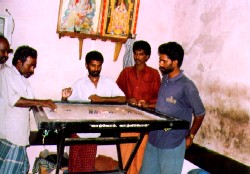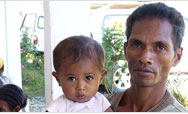You are here » Home » Telling Our Story
Success Story
Social centers directed at truck drivers help reduce the rate of HIV infections in Tamil Nadu
Social Hubs Help Teach About AIDS

| |
Photo: USAID/Virginia Foley
|
|
Games and peer educators have lured thousands of Indian truck drivers into HIV/AIDS education centers.
Due in part to the rigorous efforts of USAID and its partners, overall HIV infection rates are now on a downward trend in Tamil Nadu.
|
Every day, 6,000 long-distance truckers and their assistants travel along India's Chennai-Bangalore
highway, often stopping for up to two weeks along the way to wait for their next assignments. Separated
from their families for long periods of time, these drivers are highly, and uniquely, vulnerable to
contracting HIV/AIDS.
In India, the HIV/AIDS epidemic is at a critical stage; 5.1 million people are infected, a number
second only to South Africa. And although most HIV/AIDS infections in India are contracted sexually,
95 percent of infected women have relations only with their husbands. Chennai's state of Tamil Nadu,
specifically, has been identified as a geographic "hot spot" for higher infection rates.
USAID is working with the government of India to design social hubs that attract truck drivers and
then educate them about ways to avoid HIV/AIDS. The Chennai-Bangalore highway now has four social
centers where, between socializing and games of caroms, peer educators — including mechanics,
telephone operators, bicycle repairmen and tea-shop owners - share information about how to protect
themselves from contracting HIV.
One method peer educators use is to start a conversation with a trucker about a sick friend,
inviting the driver to talk about similar concerns with someone he knows. Gradually the conversation
turns to the symptoms of sexually transmitted diseases and HIV/AIDS, necessity of treatment, medical
services available, importance of prevention and benefits of abstaining from multi-partner sex. Puzzles,
games, educational posters and even playing cards provide additional information to back up the
interaction.
Each driver leaves the drop-in center with a handy kit to hold paperwork required for highway
inspections — and which is lined with illustrations and information on how to stop the spread of
HIV/AIDS.
Due in part to the vigorous efforts of USAID and its partners, overall HIV infection rates are
now on a downward trend in Tamil Nadu.
Print-friendly version of this page (40kb - PDF)
Click here for high-res photo
Back to Top ^ | 

